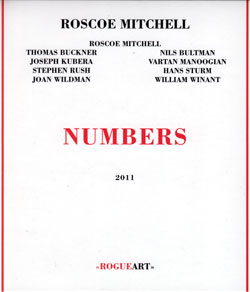
Roscoe Mitchell needs no introduction. His hundreds of recordings since the 1960's more than speak for themselves. This latest set his chamber-oriented compositions, titled "Numbers", begin with the haunting "Bells for New Orleans (prelude)". It's a good bet the devastation of hurricane Katrina is the inspiration for this pensive vignette as it alternates between hopeful tinkling and violent crashing of bells, blanketed in suspended, mournful overtones. It is followed by "9/9/99", which moves in clusters of piano/violin duet, and brings to mind certain sections of 'Unit Structures' by Cecil Taylor. Its statements come in tightly wound cells, angular and textural, which occasionally subside into more lilting phrases.
"Sketches" continues in piano/strings duo but swaps violin for the double bass of Hans Sturm, giving the piece a slightly more somber air. Joan Wildman's opening dissonant chords hang in the air as the bowed bass signals a lamenting melody. Beauty and sorrow are expressed, turning momentarily hopeful, falling back into a discordant refrain, and ending in a feeling of reconciliation. Following these are a trio of pieces featuring the poetry of e.e. cummings- "because it's", "this", and "dim", all sung by Thomas Buckner, and accompanied by Joseph Kubera on piano (also appearing on "9/9/99"). The experimental prose of cummings is juxtaposed with a quite ordered musical backdrop on all three selections; a stark contrast to the irregularity of the poems' cadences. Mitchell and cummings appear fitting collaborators as they both arrived at new ways of communication by twisting notions of conventional organization and "punctuation" of their respected languages.
"Bells for New Orleans" marks the intermission point with a piercing re-imagining of the opening version, this time on orchestra bells. Overtones appear and interact with the progression of notes, creating a tonal overload and ending with a series of loudly struck chords.
At this point Mr. Mitchell joins the proceedings in a duet with vibes called "WR/C 2A Opus 1". This piece moves along in elegant conversation between the two instruments residing in a rhythmic world closer to third stream than swing. In fact, the only music even approximating a dotted eighth feel found here happens during the "8/8/88" compositions, which by the 2nd movement devolves into the most fragmented stride piano I have ever heard. Stephen Rush is responsible for this delightfully damaged interpretation.
Next we come to "9/9/09", a solo piece for viola that seesaws between bowed and plucked passages, with Nils Bultman sometimes sounding like 2 people at once. Finally"Bells for New Orleans (postlude)" tolls the last notes of this fine set of compositions.
I don't know how much improvisation figures into the interpretation of Roscoe Mitchell's scores, but one would assume that it does at least to some degree. His "serious" works, combined with his many improvised pieces, are adding up to a momentous body of work, documenting this great artist's lifetime of achievements.
Comments and Feedback:
|



